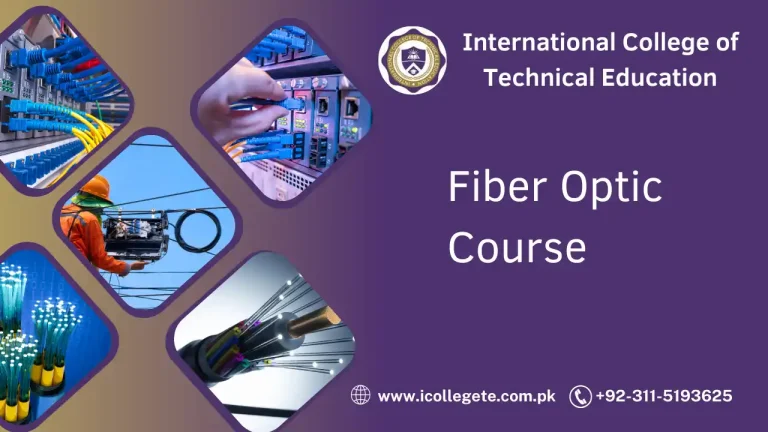In a world where environmental challenges such as pollution, climate change, and resource depletion are increasingly prominent, the role of environmental engineers is more crucial than ever. The Environmental Engineering Course in Chakwal offers aspiring professionals a comprehensive understanding of the principles and practices of engineering in the context of environmental protection and sustainability. This course equips students with the knowledge and skills required to develop sustainable solutions that minimize environmental impact and enhance the health of ecosystems and communities.
The Environmental Engineering Course in Chakwal is designed to provide in-depth training in the field of environmental engineering, focusing on the development of technologies and systems to manage and protect natural resources.
students will be introduced to various environmental policies, regulations, and sustainable practices that are shaping modern engineering solutions. This course offers both theoretical knowledge and practical applications, preparing participants for a career in the fast-growing field of environmental engineering.
Course Overview
The Environmental Engineering Course in Chakwal covers a wide range of topics that help students understand the critical role engineering plays in environmental protection. Students will gain knowledge in environmental laws and regulations, sustainable practices, and the application of modern engineering technologies to solve environmental problems.
The course is structured to help students understand key areas of environmental engineering, including waste management, water treatment, environmental policy, and ecological restoration. Real-world case studies and hands-on activities are an integral part of the course, ensuring that students are equipped with the practical skills they need to succeed in their careers.
Key aspects of the course include:
- Sustainable Development: Understanding the principles of sustainable development and how to integrate them into engineering projects.
- Pollution Control: Learning methods for reducing environmental pollution, including air, water, and land pollution.
- Wastewater Treatment: Gaining expertise in the processes used to treat and manage wastewater.
- Energy Efficiency: Understanding energy management and how to incorporate energy-efficient practices in engineering projects.
- Environmental Regulations: Familiarizing students with international and local environmental laws, guidelines, and standards.
Study Units
The Environmental Engineering Course is divided into several study units that cover the following key topics:
- Introduction to Environmental Engineering
- Overview of environmental engineering principles
- The role of environmental engineers in solving global environmental issues
- Introduction to environmental ethics and sustainable development
- Environmental Policies and Regulations
- Study of environmental laws, regulations, and standards
- Local and international environmental policies and their impact on industries
- Environmental impact assessments (EIA) and their role in project planning
- Water and Wastewater Treatment
- Principles and techniques in water treatment and purification
- Wastewater treatment methods: physical, chemical, and biological processes
- Design and operation of water treatment plants
- Air Quality Management
- Identifying sources of air pollution and its effects on health and the environment
- Techniques for monitoring and controlling air pollutants
- Air quality management strategies and technology
- Solid Waste Management
- Methods for waste reduction, recycling, and disposal
- Environmental impact of waste and strategies for sustainable waste management
- Design and implementation of solid waste management systems
- Environmental Risk Assessment
- Understanding environmental risks and their implications
- Risk assessment techniques and tools for identifying hazards and mitigating impacts
- Environmental health and safety considerations in engineering projects
- Renewable Energy and Sustainability
- Introduction to renewable energy sources (solar, wind, geothermal, etc.)
- Sustainable energy solutions and their application in engineering projects
- Strategies for promoting energy efficiency in industrial and residential settings
- Ecological Restoration and Conservation
- Methods for restoring damaged ecosystems
- Conservation techniques for protecting biodiversity
- Sustainable land use and resource management practices
Learning Outcomes
By the end of the Environmental Engineering Course in Chakwal, students will be able to:
- Understand Environmental Engineering Principles: Gain an in-depth understanding of the fundamental principles of environmental engineering and their applications in addressing environmental challenges.
- Apply Engineering Solutions: Apply environmental engineering techniques to manage water, air, and land pollution, as well as waste treatment and resource management.
- Design Environmental Systems: Design and implement effective environmental systems such as water treatment plants, waste management systems, and pollution control measures.
- Analyze Environmental Policies and Regulations: Understand and interpret local and international environmental laws and regulations and how they influence engineering decisions.
- Promote Sustainable Development: Advocate for and integrate sustainable development practices into engineering projects to minimize environmental harm.
- Evaluate Environmental Impact: Conduct environmental impact assessments and recommend measures to reduce the environmental footprint of engineering projects.
Course Benefits
The Environmental Engineering Course in Chakwal provides numerous benefits for students and professionals, including:
- Comprehensive Knowledge: Students will gain a thorough understanding of environmental engineering principles, techniques, and policies that will help them tackle real-world environmental challenges.
- Career Advancement: The course prepares students for a wide range of career opportunities in both the private and public sectors, including roles in environmental consulting, urban planning, waste management, and government agencies.
- Hands-On Training: Practical experience in water treatment, waste management, and air pollution control will enable students to apply their knowledge in real-world situations.
- Sustainable Solutions: Gain expertise in developing sustainable solutions that balance environmental protection with industrial development, helping companies meet regulatory requirements while contributing to global sustainability efforts.
- Global Relevance: The knowledge gained through the course is internationally recognized, offering career opportunities not only in Pakistan but also around the world.
- Community and Environmental Impact: Students will be equipped with the tools to contribute to the well-being of their communities by ensuring that engineering projects minimize environmental impact.
Who is This Course For?
The Environmental Engineering Course in Chakwal is ideal for:
- Engineering Students: Those studying civil, mechanical, or environmental engineering who want to specialize in sustainability and environmental protection.
- Environmental Professionals: Individuals working in the field of environmental science or policy who wish to broaden their understanding of engineering solutions.
- Government Officials and Planners: Government employees involved in environmental regulation, urban planning, or public health who want to develop engineering-based solutions to environmental challenges.
- Industry Professionals: Engineers, managers, and consultants working in industries that need to comply with environmental regulations and promote sustainability.
- Anyone Interested in Environmental Protection: Individuals passionate about environmental conservation and sustainability who want to transition into the engineering field.
Future Progression for This Course
After completing the Environmental Engineering Course in Chakwal, students have several options for career progression:
- Advanced Environmental Engineering Studies: Continue with advanced degrees (Master’s or PhD) in environmental engineering or related fields for more specialized expertise.
- Environmental Consultant: Work as a consultant for businesses and organizations, advising them on compliance with environmental regulations, sustainability strategies, and pollution control methods.
- Sustainability Manager: Take on managerial roles in companies or government agencies where sustainability and environmental protection are a key focus.
- Public Sector Roles: Join governmental or non-governmental organizations that focus on environmental protection, conservation, and urban planning.
- Environmental Health and Safety Specialist: Work in industries to ensure that workplace practices align with environmental safety standards and regulations.
- Research and Development: Contribute to the development of new technologies and methods for improving environmental engineering practices and reducing human impact on the planet.
The Environmental Engineering Course in Chakwal is an excellent choice for anyone interested in solving the environmental challenges facing our world today. By providing comprehensive knowledge, practical experience, and insights into sustainable practices, this course equips students to take on key roles in the environmental engineering field.
If you’re passionate about creating a sustainable future and are eager to make a difference, this course offers the perfect foundation to launch your career in environmental engineering. Enroll today and take the first step toward becoming an environmental engineer committed to protecting our planet!






